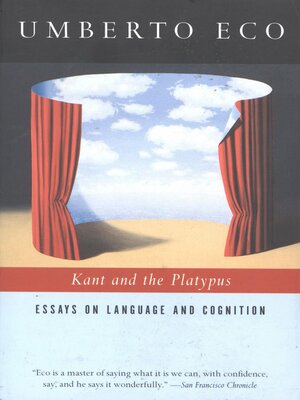
Sign up to save your library
With an OverDrive account, you can save your favorite libraries for at-a-glance information about availability. Find out more about OverDrive accounts.
Find this title in Libby, the library reading app by OverDrive.



Search for a digital library with this title
Title found at these libraries:
| Library Name | Distance |
|---|---|
| Loading... |
How do we know a cat is a cat . . . and why do we call it a cat? An “intriguing and often fascinating” look at words, perceptions, and the relationship between them (Newark Star-Ledger).
In Kant and the Platypus, the renowned semiotician, philosopher, and bestselling author of The Name of the Rose and Foucault’s Pendulum explores the question of how much of our perception of things is based on cognitive ability, and how much on linguistic resources.
In six remarkable essays, Umberto Eco explores in depth questions of reality, perception, and experience. Basing his ideas on common sense, Eco shares a vast wealth of literary and historical knowledge, touching on issues that affect us every day. At once philosophical and amusing, Kant and the Platypus is a tour of the world of our senses, told by a master of knowing what is real and what is not.
“An erudite, detailed inquirity into the philosophy of mind . . . Here, Eco is continental philosopher, semiotician, and cognitive scientist rolled all into one.” —Library Journal (starred review)
In Kant and the Platypus, the renowned semiotician, philosopher, and bestselling author of The Name of the Rose and Foucault’s Pendulum explores the question of how much of our perception of things is based on cognitive ability, and how much on linguistic resources.
In six remarkable essays, Umberto Eco explores in depth questions of reality, perception, and experience. Basing his ideas on common sense, Eco shares a vast wealth of literary and historical knowledge, touching on issues that affect us every day. At once philosophical and amusing, Kant and the Platypus is a tour of the world of our senses, told by a master of knowing what is real and what is not.
“An erudite, detailed inquirity into the philosophy of mind . . . Here, Eco is continental philosopher, semiotician, and cognitive scientist rolled all into one.” —Library Journal (starred review)






